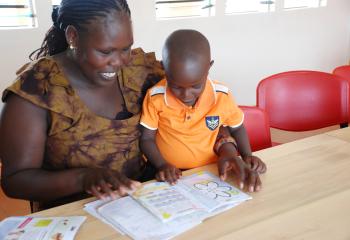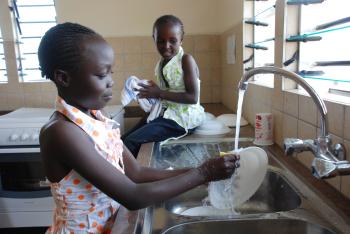A rapidly growing informal sector cannot secure the livelihood of all

Kisumu is a port city in Western Kenya and the capital of Nyanza Province. The SOS Children’s Village here is situated on the outskirts of Kisumu overlooking Lake Victoria. The city has a population of around 400,000. It is undergoing further rapid expansion due to the great number of internal migrants who come here in search of opportunity. But even though Kisumu is rich in natural resources, its once thriving industry has largely relocated to Nairobi or Mombasa. The people in the region are therefore predominantly poor and have very limited access to income-generating activities and basic social services.
Most people in Kisumu District make a living in subsistence agriculture or fishery, which makes for a very insecure livelihood. In the city, unemployment is high and most people eke out a living by means of informal work such as selling some merchandise on the streets. In fact, up to 45 per cent of families here live on less than a dollar per day. Most families cannot afford two meals a day and malnutrition and stunted growth are very common in children.
A great number of children heading the family
Recent years have seen an increase in slums, which now form a belt around the city’s central business district. The quality of the houses here – including the schools and nurseries – is very low and often unsafe. Drinking water is scarce in Kisumu, with only 40 per cent of the population receiving running water in their homes. This affects people severely, and waterborne diseases such as cholera, dysentery and typhoid are widespread. In addition, in the slums there is a lack of sanitation, solid waste management, transportation, and health services.
Kisumu District is one of the areas in the country that is severely affected by HIV/AIDS – at an estimated 24 per cent, HIV prevalence in Kisumu is the highest in all of Kenya. As a consequence, many children have been orphaned. When parents die young, this often means that a child, usually the oldest sibling, becomes the head of the family. These children then do everything they can to put food on the table, which usually means they drop out of education and work to try and raise some money. Children and young people are not usually aware of their rights and the support networks available to them are insufficient.
What we do in Kisumu

SOS Children’s Villages began its work in Kisumu in 2010. Our social centre here provides a family strengthening programme to the local community, which aims to alleviate hardship so that family stability can be upheld and children will not be abandoned. The social centre supports families in feeding, clothing and providing shelter for their children, as well as ensuring that the children attend school and make progress in their learning. Many of these families have been affected by HIV/AIDS.
We also offer basic health care. It also includes an HIV/AIDS clinic, which offers voluntary counselling and testing as well as anti-retroviral therapy. We also provide run a mother and child, and run vaccination campaigns. For example in 2014, co-workers collaborated with the government and went out to the communities to raise awareness and vaccinate children against polio.
For children from the region who can no longer live with their parents, 11 SOS families can provide a loving home for up to 150 children. In each family, the children live with their brothers and sisters, affectionately cared for by their SOS mother.
The children attend the SOS Kindergarten together with children from the neighbourhood. There is also a class for children with special needs, where the Montessori Method of teaching is applied. The kindergarten ensures that children from SOS families make friends and are integrated into the local community from a young age.